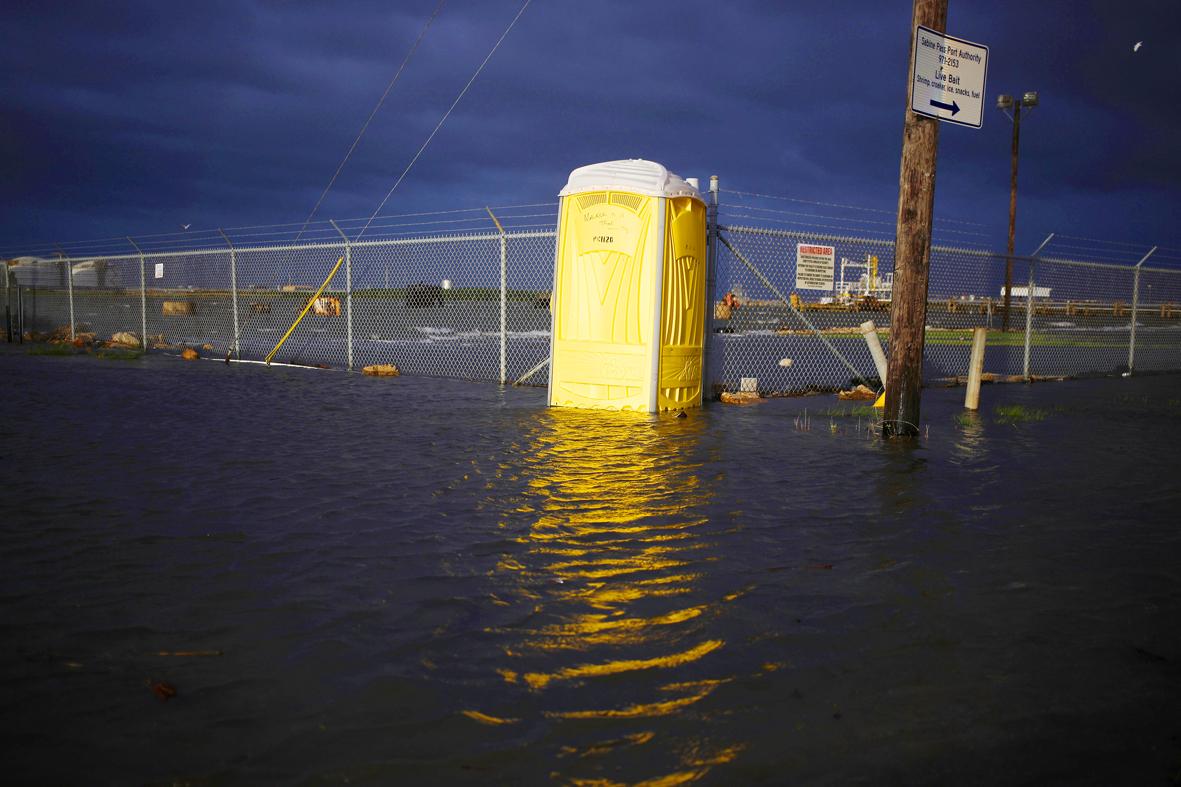Hurricane Laura early yesterday pounded the US’ Gulf Coast for hours with ferocious wind, torrential rains and rising seawater as it roared ashore over southwestern Louisiana near the Texas border.
Authorities had ordered coastal residents to get out, but not everyone did in an area that was devastated by Rita in 2005.
Videos on social media showed Laura’s winds battering a tall building in Lake Charles, blowing out windows as glass and debris flew to the ground.

Photo: Bloomberg
“There are some people still in town and people are calling ... but there ain’t no way to get to them,” Tony Guillory, president of the Calcasieu Parish Police Jury, said early yesterday morning by telephone as he hunkered down in a Lake Charles government building that was shaking from the storm.
Guillory said that he hoped stranded people could be rescued later yesterday, but feared that blocked roads, downed power lines and flooding could get in the way.
Officials said that search missions and damage assessments would begin when conditions allow it.
With more than 290,000 homes and businesses without power in the two states, near-constant lightning provided the only light for some.
The US National Hurricane Center said that Laura intensified rapidly before plowing into land with sustained winds of 241kph at 1am as a Category 4 hurricane near Cameron, a 400-person community about 48km east of the Texas border.
“Unsurvivable storm surge with large and destructive waves will cause catastrophic damage,” forecasters said, adding that the storm surge could reach 4m to 6m in Port Arthur, Texas, and a stretch of Louisiana including Lake Charles.
“This surge could penetrate up to 40 miles [64km] inland from the immediate coastline, and flood waters will not fully recede for several days,” the center said.
Hours after landfall, Laura was still a Category 3 hurricane, with maximum sustained winds of 195kph. Its center was past Lake Charles, moving north at about 24kph, but with damaging winds that stretched over much of Louisiana and parts of eastern Texas.
More than 580,000 coastal residents were under orders to flee in the largest evacuation since the COVID-19 pandemic began and many did, filling hotels and sleeping in vehicles, as officials did not want to open mass shelters and worsen the spread of COVID-19.
In Cameron Parish, where Laura came ashore, officials said that at least 150 people refused pleas to leave.
Becky Clements, 56, did not take chances. She evacuated from Lake Charles after hearing that it could take a direct hit. With memories of the destruction almost 15 years ago by Hurricane Rita, she and her family found an Airbnb hundreds of kilometers inland.
“The devastation afterward in our town and that whole corner of the state was just awful,” Clements said on Wednesday. “Whole communities were washed away, never to exist again.”
Forecasters expected a weakened Laura to move northward through Louisiana and cause widespread flash flooding in states far from the coast.
After turning eastward and reaching the Atlantic Ocean, it could again become a tropical storm and threaten the northeastern US.

As the sun sets on another scorching Yangon day, the hot and bothered descend on the Myanmar city’s parks, the coolest place to spend an evening during yet another power blackout. A wave of exceptionally hot weather has blasted Southeast Asia this week, sending the mercury to 45°C and prompting thousands of schools to suspend in-person classes. Even before the chaos and conflict unleashed by the military’s 2021 coup, Myanmar’s creaky and outdated electricity grid struggled to keep fans whirling and air conditioners humming during the hot season. Now, infrastructure attacks and dwindling offshore gas reserves mean those who cannot afford expensive diesel

Does Argentine President Javier Milei communicate with a ghost dog whose death he refuses to accept? Forced to respond to questions about his mental health, the president’s office has lashed out at “disrespectful” speculation. Twice this week, presidential spokesman Manuel Adorni was asked about Milei’s English Mastiff, Conan, said to have died seven years ago. Milei, 53, had Conan cloned, and today is believed to own four copies he refers to as “four-legged children.” Or is it five? In an interview with CNN this month, Milei referred to his five dogs, whose faces and names he had engraved on the presidential baton. Conan,

‘IN A DIFFERENT PLACE’: The envoy first visited Shanghai, where he attended a Chinese basketball playoff match, and is to meet top officials in Beijing tomorrow US Secretary of State Antony Blinken yesterday arrived in China on his second visit in a year as the US ramps up pressure on its rival over its support for Russia while also seeking to manage tensions with Beijing. The US diplomat tomorrow is to meet China’s top brass in Beijing, where he is also expected to plead for restraint as Taiwan inaugurates president-elect William Lai (賴清德), and to raise US concerns on Chinese trade practices. However, Blinken is also seeking to stabilize ties, with tensions between the world’s two largest economies easing since his previous visit in June last year. At the

Beijing is continuing to commit genocide and crimes against humanity against Uyghurs and other Muslim minorities in its western Xinjiang province, U.S. Secretary of State Antony Blinken said in a report published on Monday, ahead of his planned visit to China this week. The State Department’s annual human rights report, which documents abuses recorded all over the world during the previous calendar year, repeated language from previous years on the treatment of Muslims in Xinjiang, but the publication raises the issue ahead of delicate talks, including on the war in Ukraine and global trade, between the top U.S. diplomat and Chinese